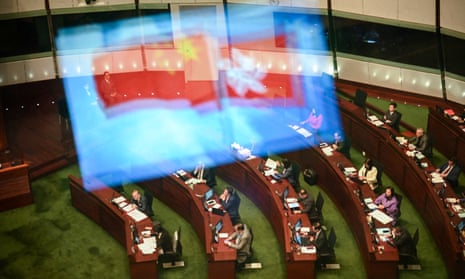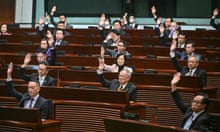Hong Kong’s new national security law came into force on Saturday, putting into immediate effect tough penalties of up to life imprisonment for crimes including treason and insurrection.
The law – commonly referred to as article 23 – targets five categories of national security crimes, and was swiftly passed by Hong Kong’s opposition-free legislature on Tuesday.
The US, the EU, Japan and Britain have been among the law’s strongest critics, with the UK foreign secretary, David Cameron, saying it would “further damage the rights and freedoms” of those in the city.
The US secretary of state, Antony Blinken, on Friday expressed “deep concern” that the law could be used to undermine rights and curb dissent, adding it could damage Hong Kong’s reputation as an international finance hub.
But the Hong Kong leader, John Lee, has called the passage of the “safeguarding national security ordinance” a “historic moment”.
He has often cited Hong Kong’s “constitutional responsibility” to create the new legislation as required by the Basic Law, the city’s mini-constitution since its handover from Britain to China in 1997.
Lee also said the law was necessary to “prevent black-clad violence”, a reference to Hong Kong’s massive and at times violent pro-democracy protests in 2019, which brought hundreds of thousands to the streets demanding greater autonomy from Beijing’s grip.
In response, authorities cracked down on protesters, and Beijing imposed a national security law in 2020 – targeting secession, subversion, terrorism and collusion with foreign forces – which has in effect silenced opposition voices among Hong Kong’s once-vibrant civil society.
Nearly 300 people have been arrested under the 2020 law so far.
But Lee – who has been hit with sanctions by the US for his role as security chief during the 2019 protests – has said article 23 was still needed to “plug” the legislative gaps of Beijing’s law.
Under the new law, penalties run up to life in prison for sabotage endangering national security, treason and insurrection; 20 years for espionage and sabotage; and 14 years for external interference.
It has also expanded the British colonial-era offence of “sedition” to include inciting hatred against China’s Communist party leadership, with an aggravated sentence of up to 10 years in jail.
City leader Lee is now empowered to create new offences carrying jail terms of up to seven years through subsidiary legislation, while the security minister can impose punitive measures on activists who are overseas, including cancelling their passports.
Police powers have also been expanded to permit detaining people for up to 16 days without charge – a jump from the current 48 hours – and to restrict a suspect from meeting lawyers and communicating with others.
The UK and Australia on Friday updated their travel advice to warn citizens about the risks of breaching the new law when travelling to Hong Kong.
The former US House speaker Nancy Pelosi said at a Friday press conference that the new law was an “alarming expansion of the Chinese Communist party’s assault on freedom in Hong Kong”.
A previous attempt by the government to introduce article 23 in 2003 was dropped after half a million Hongkongers protested against the law.
This time, public response in the city was muted after the law’s passage.
But protests are expected worldwide, from Australia and Canada to Britain, where a large Hong Kong diaspora relocated after the government’s crackdown on the 2019 protests.
“The purpose of this new law is to crush the only bit of freedom left in Hong Kong by extending sentences and expanding the definition of national security,” said US-based activist Frances Hui.
Hui – who is subject to a $128,000 (£102,000) bounty issued by Hong Kong authorities – called on the Biden administration to impose sanctions on those who took part in passing the new law.








